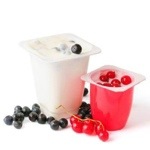FAT FREE MYTHS
In the 80s we were led to believe consuming dietary fat was the number one contributor to weight gain and heart disease. Suddenly products everywhere were labelled “fat free,” and we were assuming that this meant they were health foods. Fat-free and low fat flavoured yoghurts / ice cream and foods were ‘go’, along with processed meals as long we ditched the butter, oil, etc.
What the public weren’t being told is that weight gain is also the result of processed foods made with sugar and white flour and some of those foods have upwards of 15 grams of sugar in that tiny 6-ounce serving which send your insulin levels soaring.
Insulin is called the fat-storing hormone because it decides if food will be burned as fuel or stored as fat. In addition, high insulin levels have been linked in numerous medical studies to heart disease and type 2 diabetes.
On So Lean and Clean we educate you on the best foods to control your insulin. By reducing or eliminating the foods that spike your insulin, you train your body to burn the calories you eat and burn off your stored fat for energy.
Its not only people with diabetes that need to keep an eye on their insulin levels.High insulin levels can have negative effects on everyone’s health.
Here are a few improvements you can make to your diet and lifestyle
Cut back on sugar and refined carbohydrates.
Eat foods that are high in certain nutrients. DHEA, vitamin D, omega-3 fatty acids, chromium, and biotin can all help lower insulin resistance and your insulin levels.
Bring your hormones into balance. It’s not just what you eat that affects your insulin levels. Imbalanced hormones also lead to high insulin levels,: When one hormone drops, other hormones rise. So if your estrogen, progesterone, and testosterone levels decline (a common part of aging), this will increase your levels of the fat-storing hormones, insulin and cortisol.
My eating plan is designed to help you remove the spikes and dips in your insulin levels.

